Man's Sister Compares Birth Trauma To Being A Dog Mom, Wife Flips Out On Her And Orders Her Out
Birth trauma is the distress a woman feels during or after giving birth. Trauma can be physical, but it also frequently affects the mind and emotions.
Infant trauma is more than just what occurs during labor and delivery; it might also refer to how you, the mother, feel subsequently.
It's possible to experience shock, guilt, or numbness after giving birth, as well as worry or panic attacks. If you experience any of these signs, you might be suffering from prenatal trauma.
If so, you're definitely not the only one, as the OP's wife experienced the same thing. She and the OP's son were hospitalized for a week, which was incredibly nerve-wracking and traumatic for them.
Additionally, the OP’s wife doesn't like dogs, and she has valid reasons for this. The OP's family doesn't have dogs, but his sister has two German Shepherds, a Great Dane, and two ankle-biters of some sort that are Heeler breed mixes.
As a result, she never attends family gatherings, or if she does, the OP's wife doesn't attend because her dogs will be there. They had a family gathering one day, and the OP's sister came, but one thing led to another, and the OP's sister flipped out on her.
Read the entire story for yourself below.
The OP Begins His Story

The OP provided the necessary information here

He also mentioned that his wife is already seeing a therapist
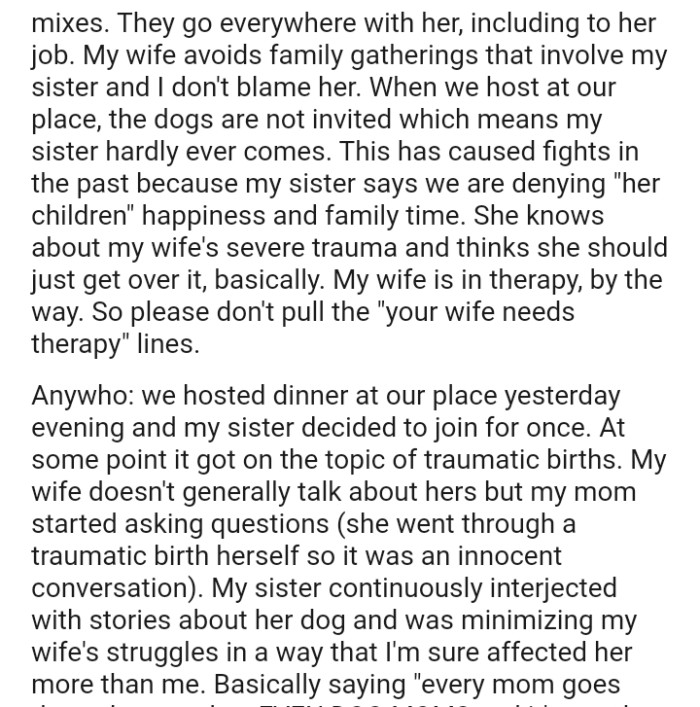
The Impact of Minimization in Relationships
When someone's experiences are minimized—like comparing birth trauma to pet ownership—it can trigger feelings of invalidation and resentment. Dr. John Gottman, a renowned relationship researcher, emphasizes that such comparisons can undermine emotional intimacy and lead to conflict.
His studies indicate that when one partner feels their experiences are belittled, it can erode trust and safety in the relationship. This is particularly true when significant life events like childbirth are involved, as they often carry deep emotional weight.
The Impact of Invalidation
Dr. Emily Roberts, a psychologist at the University of Michigan, highlights that invalidation can significantly impact mental health. When individuals feel their emotions are minimized, it can lead to increased feelings of resentment and isolation. Research shows that emotional invalidation is linked to higher instances of anxiety and depression, particularly in familial relationships.
In this scenario, the sister's comments may stem from her own unresolved issues regarding attachment and empathy. By comparing traumatic experiences in childbirth to pet ownership, she inadvertently dismisses the profound emotional struggles that the wife is experiencing.
At one point, the OP did tell his sister to shut up, but she kept at it

The whole comments were smeared with YTAs, and here are some of them below

You made a meager attempt to put her in her place

Psychological research shows that emotional validation is crucial for healthy communication in relationships. When one partner shares their struggles, the other should respond with empathy rather than comparison.
According to a study published in the Journal of Personality and Social Psychology, emotional validation fosters connection and understanding, making it essential in navigating sensitive topics.
Studies published in the Journal of Personality and Social Psychology reveal that empathy is a crucial component in maintaining healthy relationships. When one party fails to validate another’s feelings, it can create a rift that makes open communication difficult. This situation exemplifies how important it is for family members to engage in active listening and validate each other's experiences, regardless of whether they can fully understand them.
You should have handled it earlier on
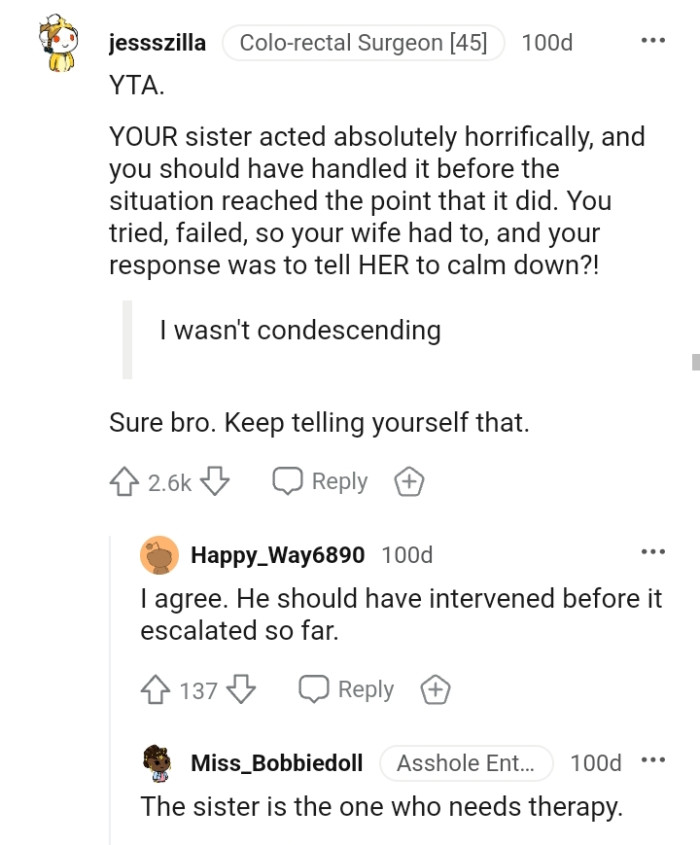
It gives the impression that you don't care
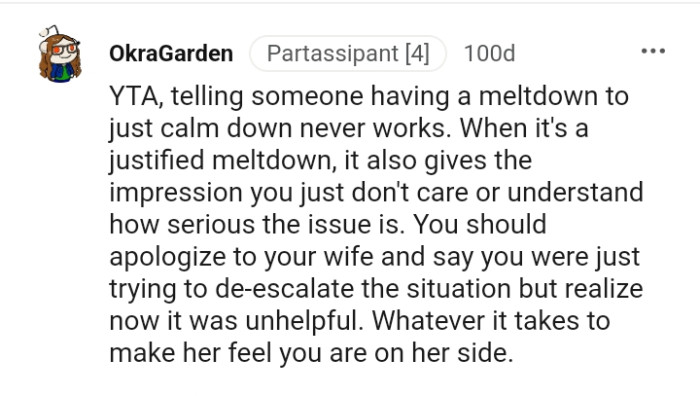
You were just making the whole matter worse

Communication Strategies for Couples
One effective approach for couples facing such conflicts is the 'active listening' technique. This involves fully engaging with the speaker, reflecting their feelings back, and avoiding premature judgments.
According to research from the University of California, Berkeley, active listening can significantly reduce misunderstandings and promote a deeper connection between partners.
Practicing this can help couples address feelings of hurt and frustration, leading to constructive discussions instead of defensive arguments.
Exploring Defense Mechanisms
Psychoanalysts often discuss how defense mechanisms can shape interpersonal dynamics. The sister’s behavior might reflect a defense mechanism known as rationalization, where she justifies her comments to protect herself from confronting her own feelings of inadequacy or fear about parenting. Understanding this pattern can help individuals recognize when they are projecting their own insecurities onto others.
Therapeutic interventions that focus on building emotional intelligence can facilitate healthier interactions. For instance, practicing empathy exercises can enhance understanding and reduce conflict within family dynamics.
What the OP did is absolutely condescending

Your wife heard your words as a dismissive silencing tactic
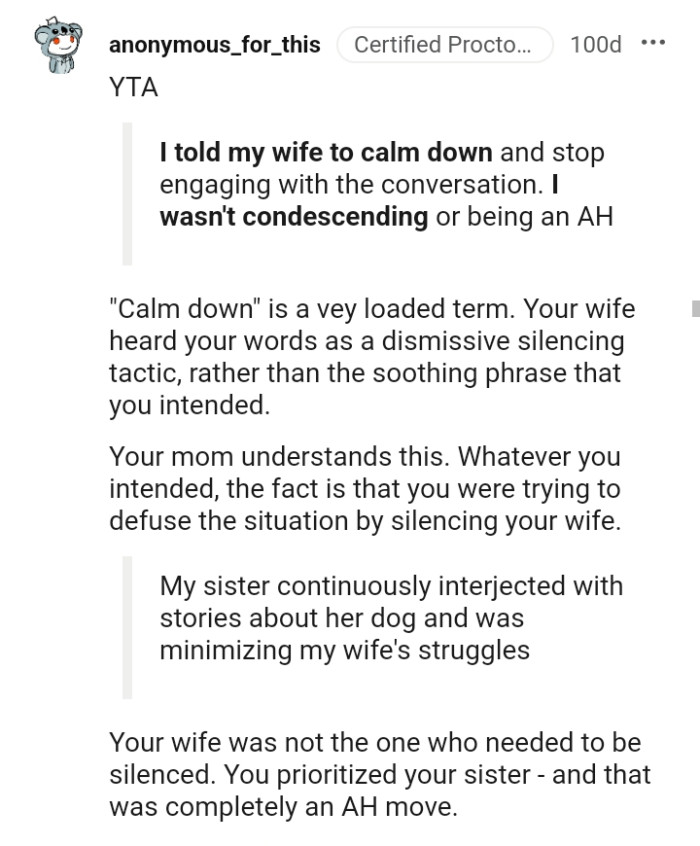
It was incredibly insensitive of your sister

Conflict in relationships often stems from unmet emotional needs. When one partner feels unheard or invalidated, it can lead to resentment and escalation of disputes.
Dr. Harville Hendrix, a marriage therapist, emphasizes that identifying each other's emotional needs is vital. Couples should regularly check in with each other to ensure both partners feel valued and understood.
Communication theories suggest that the way we express ourselves is often rooted in our previous experiences. When the sister interjects with her own narratives, it may be her way of coping with feelings of helplessness or inadequacy when faced with her sibling's trauma. Recognizing these underlying motivations can create space for more constructive dialogues.
She was being condescending to both women

From a dog mom to the OP

Your sister needs some serious therapy

Understanding Emotional Triggers
Emotional triggers can play a significant role in how individuals react during conflicts. When one partner brings up a sensitive topic, it can activate past wounds, leading to an exaggerated emotional response.
Research has shown that recognizing these triggers is essential for emotional regulation. Awareness allows partners to communicate more effectively and avoid escalation.
Practical Solutions for Conflict Resolution
To navigate conflicts like this, professionals recommend using 'I' statements, which can reduce defensiveness and promote open dialogue. For example, the wife might express her feelings by saying, 'I feel hurt when my experiences are compared to less significant ones.' This approach fosters a more empathetic exchange and helps the sister understand the impact of her words.
Additionally, joint family therapy sessions could provide a safe space for all parties to express their feelings and learn how to support one another effectively.
Apologize to your wife and talk to your sister
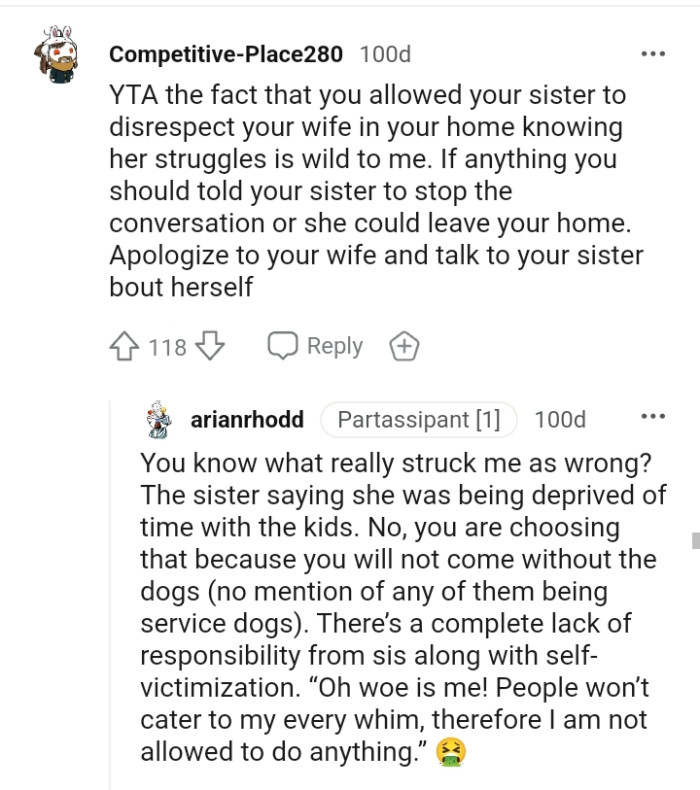
You are putting the onus on your wife

You should have waited until your sister left
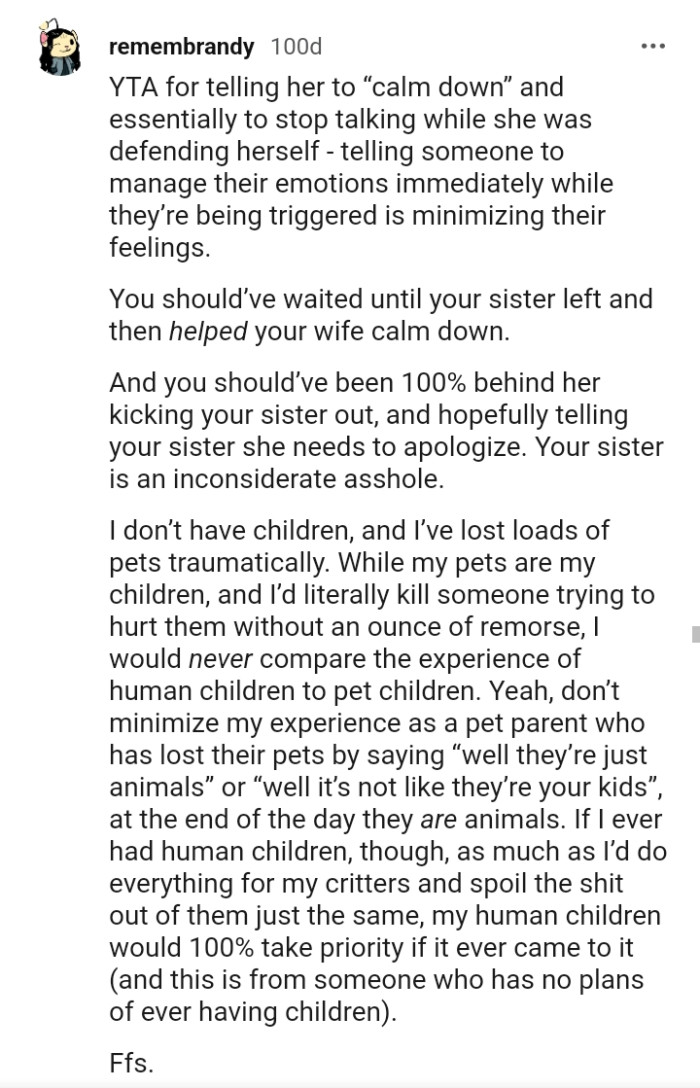
One practical solution is to establish a 'time-out' policy during heated discussions. This gives both partners a chance to cool down and reflect on their feelings before re-engaging in conversation.
Studies indicate that taking breaks during conflicts can lead to more rational discussions and improved relationship satisfaction, as it prevents the cycle of blame and defensiveness.
Research from the American Psychological Association emphasizes the importance of emotional support during times of trauma. This means not only validating one another's experiences but also offering practical support in ways that matter to the affected individual. Creating an environment where each family member feels heard and valued can strengthen bonds and reduce future conflicts.
You didn't mention yourself interjecting at all

This is often unfair to the good person

You chose to de-escalate through your wife

The Role of Empathy in Relationships
Empathy is crucial in navigating challenging conversations. Understanding the emotional landscape of a partner can help de-escalate tensions and foster connection.
According to Dr. Brené Brown, vulnerability and empathy are key components of a strong relationship. When partners practice empathy, they create a safe space for open dialogue, reducing the likelihood of misunderstandings.
Addressing Emotional Needs
Understanding and addressing emotional needs is vital in familial relationships. When siblings fail to acknowledge each other’s struggles, it can lead to long-term resentment. A study in the Journal of Abnormal Psychology found that unresolved conflicts often resurface in unexpected ways, perpetuating cycles of dysfunction.
The sister might benefit from exploring her own feelings about motherhood and the pressures that come with it. Engaging in self-reflection or therapy could offer insights into her behavior and help her approach her sister with more compassion.
You need to apologize for not being her protector
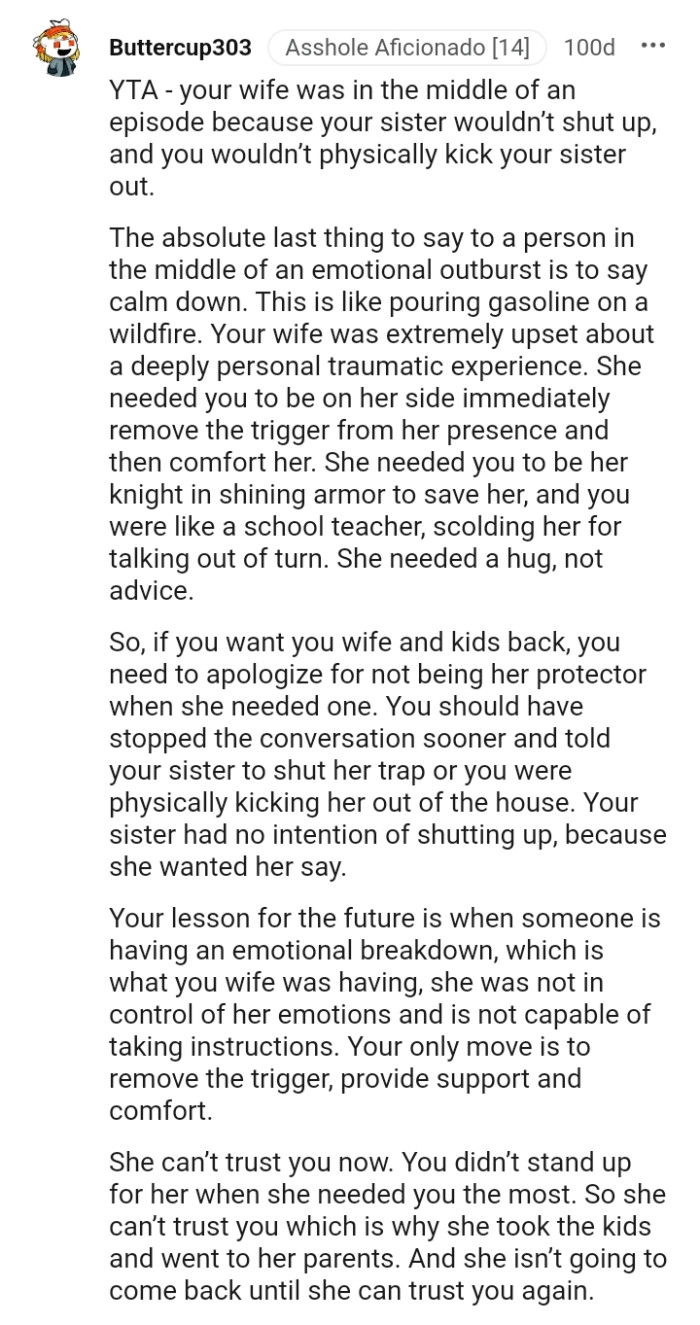
You don't joke about any kind of trauma

You should have told your sister to shut up

To improve relational dynamics, couples may benefit from seeking professional guidance. Therapy can provide tools for effective communication and emotional validation.
Research shows that couples who engage in therapy often report higher levels of satisfaction and connection in their relationships.
Finally, incorporating mindfulness practices can also help family members regulate their emotions and respond more thoughtfully. Mindfulness encourages individuals to observe their thoughts and feelings without judgment, which can lead to increased empathy and understanding in relationships. Such practices can be beneficial for both the sister and the wife as they navigate their complex emotions.
After giving birth, the aftereffects of birth stress may occasionally manifest and last for some time. You might have felt scared, powerless, or unheard at the moment of your birth, so having someone belittle such topics can trigger you.
The OP's wife snapped because his sister was insensitive to a point she couldn't even fathom, and Redditors were against the OP for his words. He received the AH verdict.
Psychological Analysis
This situation reflects a classic case of emotional invalidation, which can lead to significant interpersonal conflict. It’s essential for family members to recognize the impact of their words and to strive for empathy, especially when one is experiencing trauma.
Analysis generated by AI
Analysis & Alternative Approaches
The dynamics illustrated in this article highlight the complexities of familial relationships and emotional experiences. Understanding the psychological principles at play can help individuals navigate their interactions more effectively. Creating an emotionally supportive environment is essential for healing and developing stronger family bonds.
Analysis & Alternative Approaches
Understanding and addressing emotional dynamics in relationships is vital for maintaining healthy connections. Research consistently shows that effective communication and emotional validation are key elements in preventing conflicts.
Implementing strategies such as active listening and empathy can significantly enhance relationship satisfaction and resilience against misunderstandings.



